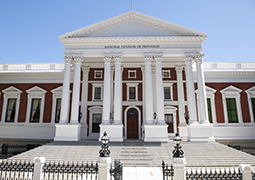
The National Council of Provinces (NCOP) marked Women’s Day with a debate on “Gender Equality Today for a Sustainable Tomorrow”. The virtual discussion was opened by the Minister for Women, Youth and Persons with Disabilities, Ms Maite Nkoana-Mashabane.
The Minister referred to a World Bank gender assessment study in South Africa, which showed how far South Africa has progressed towards gender equality since 1994. The report noted factors such as the lack of economic empowerment for women, the high prevalence of gender-based violence and femicide (GBVF) and the poor implementation of progressive legislative framework on women emancipation as stumbling blocks to further progress.
Minister Nkoana-Mashabane also highlighted some of her department’s work in advocating for the empowerment of women and gender equality. “As the custodian for the national strategic plan on GBVF, we continue to lobby all government departments and social partners to collaborate in the fight against GBV and femicide,” she said.
The Minister added that her department has developed the comprehensive national prevention strategy on GBVF designed to proactively predict and prevent GBV. To this end, the department continues to work with the Department of Cooperative Governance and Traditional Affairs to ensure the integration of GBV plans into the District Development Model and municipalities’ integrated development plans.
“Over the past two years strides have been made in the following areas: Nedlac has concluded its consultation on the National Council on GBV and submitted a report which will soon be presented to cabinet and Parliament for consideration and further processing. Multi-sectoral GBV rapid response teams are in the process of being established in all provinces, districts and local municipalities levels. “Although significant progress has been made, the reality is that women, children and LGBTI persons are not safe in our communities,” said the Minister.
Participating in the debate, the Deputy Chairperson of the NCOP, Ms Sylvia Lucas argued that there was a general consensus that: “The current situation in South Africa calls for the women of South Africa to exert pressure on the population to join hands and ensure the safety of our women.”
Ms Lucas referred to the 2019 Women’s Parliament resolution to embark on a process to review the entire women’s rights regime and assess the efficacy of the institutional mechanisms put in place to ensure gender equality across all three spheres of government. This process has revealed a glaring disjuncture between institutional policy and the implementation of that policy in practice.
“The outcome of the review process, as led by South African women from all walks of life, was a revised Women’s Charter for Accelerated Development, which now serves as the guide document for the women of South Africa articulating matters of urgent prioritisation. The revised charter will also serve as a roadmap for effective policy redesign going forward,” the NCOP Deputy Chairperson said.
The policy review process also revealed systemic weaknesses in gender mainstreaming at local and provincial government level. These weaknesses point to a lack of resource allocation, a lack of gender mainstreaming in planning stages and an uncoordinated gender machinery.
Mr Mbulelo Bara, a Permanent Delegate in the NCOP and DA Member of Parliament, remarked that gender equality was a fundamental human right and that South Africa’s performance in this regard is dismal, according to the World Bank. “Gender equality in South Africa was reported at one per cent in 2020, according to the World Bank, indicating how dismally we are doing,” he said.
To meet the target of the United Nations’ Sustainable Development Goals by the year 2030, Mr Bara believes that much more effort will be required. “The inclusion of women in decision-making processes should be the cornerstone of gender equality. Women should participate in all levels of government and law-making. Legislation and implementation has an impact on their daily lives,” Mr Bara concluded.
Ms Mmabatho Mokause, another NCOP Delegate and Economic Freedom Fighters representative, said the commemoration of Women’s Day in South Africa should be an opportunity to take stock of the progress made in achieving gender equality and women emancipation. “As black African women today, there is nothing to celebrate, as there is little political will to ensure that gender equality is guaranteed,” she argued.
Councillor Flora Moboa-Boltman participated in the debate on behalf of the South African Local Government Authority (SALGA). She spoke about gender equality in the context of the local government sphere. Article four of the SALGA constitution commits organised local government to promote the interest of women in local government through the 50/50 campaign. In addition, all SALGA governance structures are constitutionally bound to comply with 50/50 representation in leadership, she said.
Sakhile Mokoena
12 August 2022

